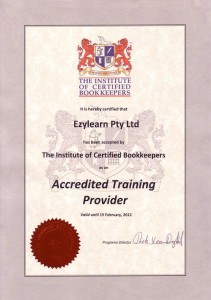
Our MYOB training courses come with LIFETIME student access and we are constantly adding new content to these courses.
When the ATO introduced changes to asset purchases we wrote a blog post about how the ATO brought in changes to the value of capital goods that had to be depreciated (raising the figure dramatically from $1000 to $6500). This content is particularly relevant at the end of each financial year so we put it into our MYOB Reporting Course.
The result is more content for you to sink your teeth into and really understand Assets, Expense, Depreciation and Accelerated Depreciation.
If you are an existing student of MYOB, you can access this new workbook free of charge within our 504 course material.
The Assets of a Business
First of all, what is an asset? When referring to the term “Asset” it is simply referring to what the business owns (ie. a car is an asset, or your computer desk is an asset).
There are two types of assets that we commonly refer to: Current Assets & Non-current Assets. A current asset generally means one that can easily be converted into ‘cash’ within the next 12 months. An example of current assets may be your business bank account balance, inventory and debtors (customers who owe you money).
Examples of non-current assets may be investments (shares or bonds), trademarks, copyrights, land, buildings and cars.
We know by now of the afore-mentioned changes that the ATO announced back on the 1st July 2012 that businesses with a turnover of less than $2M were know able to instantly write off assets of $6500 and below to an expense account —and this amount is exclusive of GST.
AN EXAMPLE: Accelerated Depreciation on a Motor Vehicle
A lot of people don’t quite get the Accelerated Depreciation side to purchasing a motor vehicle (new or secondhand) so we’ll try to explain this a little better. Let’s use the scenario of Jerry Lame:
Jerry has just purchased a new motor vehicle outright for a total of $25,999 including GST and this was obtained on 1 June 2013. As he is GST registered, he can receive an instant claim of the GST (2,363.55) component which will be applied in the 4th quarters BAS as GST paid; you may see this coding referred to as CAP on your reports, which merely represents it was a capital purchase.
Now what’s left is the remaining capital amount of 23,635.45 to purchase the asset. (This amount is the cost of the car excluding GST) and this will be seen in MYOB as an Asset At Cost. Now how do we work out the Accelerated Depreciation amount? It’s simple — we know that for the first year we can automatically receive $5000 and an additional 15% of the remaining price after the $5K. Here is how it is worked out:
When we enter this into MYOB as depreciation, we could enter a journal like:
Desc: First Year Accelerated Depreciation
CR 1-XXXX account (MV Accum Dep) $7795.32
DR 6-XXXX account (Depreciation) $7795.32
***
To find out more, enrol in our online MYOB course and have full access to this workbook — and many others that EzyLearn Online provides. Remember, if you are an existing lifetime student of MYOB, you can log into our training site and automatically get access to this new workbook, any new videos and our online helpdesk, all totally free of charge.






























